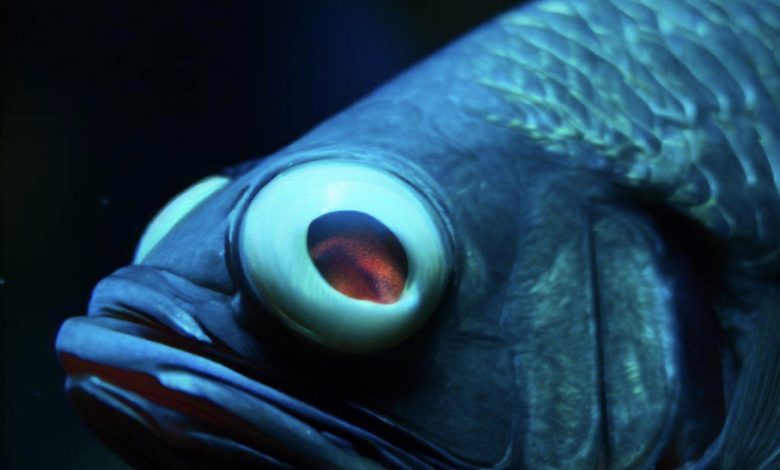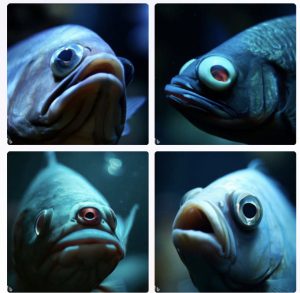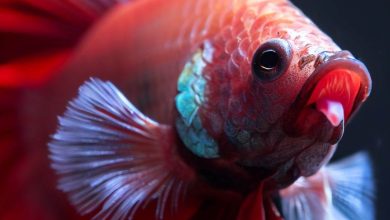Do Fish Blink?

Have you ever wondered whether fish blink? You’re in for a fascinating journey as we plunge into the depths of this watery topic. We’ll explore the ins and outs of fish eye anatomy, discover their clever protective mechanisms, and unveil the real scoop on whether fish actually blink. Get ready to be amazed!
Do Fish Blink?: Research and Findings
Time to tackle the burning question: Do fish actually blink? well, yes but not it’s not as straightforward as you might think. You see, fish may not perform full-blown voluntary and reflexive blinks as we do, but they do exhibit rapid eye movements that serve a similar purpose.
These quick eye movements help moisten and cleanse their eyes, keeping them fresh and ready for underwater action. So, while it may not be your classic blink, fish have their own special way of taking care of those peepers.
Do Fish Have Eyelids?
Alright, folks, here’s the lowdown. Fish don’t have those classic eyelids like we do. Instead, their eyes are shielded by a thin, transparent membrane called a nictitating membrane.
Think of it as a super cool eye cape! This special membrane swoops in to cover their eyes, giving them crucial protection without interfering with their vision. It’s like having a built-in underwater eye guard!

Now, don’t go thinking fish are missing out on all the blinking fun. While their version of blinking might not be exactly like ours, they’ve got some nifty tricks up their fins to keep those peepers safe and sound.
Also Read: Is Raw Fish Good for You? Benefits and Risks
Do fish sleep?
Fish don’t have the same sleep patterns as humans or mammals. They don’t enter a state of deep sleep characterized by REM (rapid eye movement) sleep. Instead, fish experience periods of rest and reduced activity.
During these resting periods, they may exhibit slower movements and reduced responsiveness, but their eyes remain open and alert. So, while fish don’t blink or have conventional sleep as we know it, they do have periods of rest.
Also Read: Why Is My Betta Fish Not Moving?
Understanding Fish Eye Anatomy and Function
Let’s dive deeper into the marvelous world of fish eyes, shall we? Fish have eyes that are perfectly designed to rock the underwater scene.
Picture this: their eyes are round and boast corneas and lenses just like ours, except they’re fine-tuned for aquatic adventures. These adaptations help fish focus and see clearly in their underwater wonderland. Talk about a vision makeover!
But here’s where things get even more interesting. Fish eyes aren’t just any old eyeballs. They’ve got some seriously cool aquatic superpowers. Some fish species can detect colors and patterns, have an expansive field of view, and can even see in ultraviolet light. It’s like they’ve got their own underwater superhero vision mode!
How Fish Protect Their Eyes
You might be wondering, “How in the coral reef do fish keep their eyes safe?” Great question! Although fish don’t blink in the same way we do, they’ve got a repertoire of protective measures to keep those eyes in top-notch condition. We’re talking next-level eye care!
One of their secret weapons is a slimy mucus layer that coats their eyes. Yup, you heard that right—a slimy shield! This special mucus layer acts as a barrier, fending off debris, pesky bacteria, and even parasites that lurk in the water. It’s like a natural defense system for their precious peepers.
The Role of Mucus in Fish Eye Protection
Let’s dive a little deeper into the slimy world of fish eye protection, shall we? That mucus layer we mentioned earlier isn’t just for show. It’s a superhero sidekick for their eyes!
This slimy shield not only keeps debris out but also reduces friction when fish swim through the water. It’s like having a built-in eye lubricant! Additionally, the mucus layer helps maintain proper hydration of the eyes, ensuring they stay moist and function at their best. Think of it as a natural moisturizer for their underwater peepers.
Now, you might be wondering, “Do different fish species blink differently?” Well, it’s a fantastic question! While fish share similar protective mechanisms, there may be variations in their eye movements and blinking-like behaviors depending on the species. Researchers are delving into these nuances to unravel the unique ways fish take care of their eyes.
Fish Blinking Myths and Misconceptions
Let’s tackle some fishy myths and set the record straight, folks! There are quite a few misconceptions floating around about fish and their blinking habits.
Contrary to popular belief, fish don’t blink in the same way we do. Their eye movements and protective mechanisms work together to ensure optimal eye health in their underwater world.
So, no, you can’t teach a fish to blink. While fish can learn and adapt to their environment through conditioning, blinking as we know it remains an exclusively human trait. But fear not, because fish have their own unique ways of caring for those mesmerizing eyes!
Remember, the wonders of nature never cease to amaze us. By understanding and appreciating the remarkable adaptations of fish eyes, we gain insights into the beauty and diversity of our underwater friends.
So, next time you gaze into an aquarium or catch a glimpse of fish in their natural habitat, marvel at the intricate designs that make their eyes a window to their extraordinary world. Happy exploring, and keep those eyes wide open!
Eye Care in Aquarium Fish
Ahoy, aquarium enthusiasts! If you’re keeping fish in your own little aquatic oasis, it’s essential to give their eyes the care they deserve. Maintaining clean and well-filtered water is crucial to reducing the risk of eye infections and preserving the health of their mucus layer. Remember, a healthy environment means happy and vibrant fish with gleaming eyes!
Take some time to observe your fish buddies. Keep an eye out for any changes in their behavior or appearance, especially around their eyes. If you notice any redness, cloudiness, or unusual behavior like excessive rubbing against objects, it’s time to consult with an aquatic veterinarian.
Early detection and prompt treatment can help nip any eye-related issues in the bud and keep your underwater pals swimming happily.
Evolutionary Wonders of Fish Eye Adaptations
Now, let’s take a moment to appreciate the awe-inspiring process of evolution that has shaped fish eye adaptations.
Over millions of years, these remarkable creatures have fine-tuned their visual systems to conquer the challenges of underwater life. It’s like a never-ending game of survival and adaptation, and fish have become the masters of their underwater domain.
Studying fish eye anatomy and protective mechanisms not only deepens our understanding of their behavior but also provides us with a glimpse into the incredible diversity of life on our blue planet. It’s a testament to the power of nature and its ability to sculpt and refine organisms to thrive in their unique environments. So, let’s celebrate the marvels of evolution that have given us fish with eyes that are nothing short of extraordinary!
The Enigma of Teaching Fish to Blink
Now, here’s a thought that might swim across your mind: Can you teach a fish to blink? As much as we’d love to imagine our fishy friends joining in on our blinking adventures, the reality is a tad different.
While fish can learn and adapt through associative conditioning, the concept of teaching them to blink remains in the realm of imagination and speculation.
Fish have their own fascinating repertoire of behaviors and adaptations, but voluntary blinking isn’t one of them. So, let’s embrace their uniqueness and continue to marvel at their underwater prowess. After all, it’s the diversity of life that makes our world so captivating!
Conclusion
So there you have it, fellow adventurers and fish enthusiasts! The mystery of fish blinking has been unraveled, revealing a world of eye adaptations, protective mechanisms, and evolutionary wonders. While fish may not blink as we do, they have developed incredible strategies to protect their eyes in their watery habitats.
From their eye-catching nictitating membrane to the superpower of slimy mucus, fish have found innovative ways to ensure their eyes stay healthy and ready for underwater exploration.
So, as you gaze into your aquarium or catch a glimpse of fish in the wild, take a moment to appreciate the beauty and complexity of their eyes and the incredible adaptations that make them true underwater marvels.
Remember, the wonders of nature are vast and ever-surprising. So, keep exploring, keep learning, and keep your eyes wide open to the breathtaking world that lies beneath the surface of the water. Happy fish-watching, my friends!





